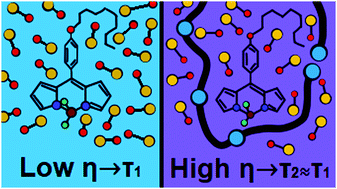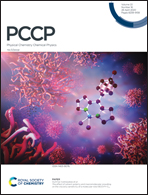The effect of solvent polarity and macromolecular crowding on the viscosity sensitivity of a molecular rotor BODIPY-C10†
Abstract
Viscosity is the key parameter of many biological systems as it influences passive diffusion, affects the lipid raft formation and plays a significant role in several diseases on a cellular level. Consequently, determination of precise viscosity values is of great interest and viscosity-sensitive fluorescent probes offer a convenient solution for this task. One of the most frequently used viscosity-sensitive probes is BODIPY-C10. Yet despite its regular use, BODIPY-C10 remains insufficiently investigated. In this work, we explored how the polarity, hydrogen bonding abilities of the solvent and the presence of macromolecules affect the viscosity-sensing qualities of BODIPY-C10. In addition, we investigated the relaxation pathway of BODIPY-C10 with the help of femtosecond transient absorption and time-dependent DFT calculations. Our results show that while BODIPY-C10 is not affected by protic solvents, accurate quantitative determination of viscosity is possible only if BODIPY-C10 is calibrated in the same polarity environment as in the sample of interest, and the size of the surrounding molecules is not larger than the size of BODIPY-C10. The latter limitation is likely to apply to all molecular rotors.

- This article is part of the themed collection: 2020 PCCP HOT Articles


 Please wait while we load your content...
Please wait while we load your content...